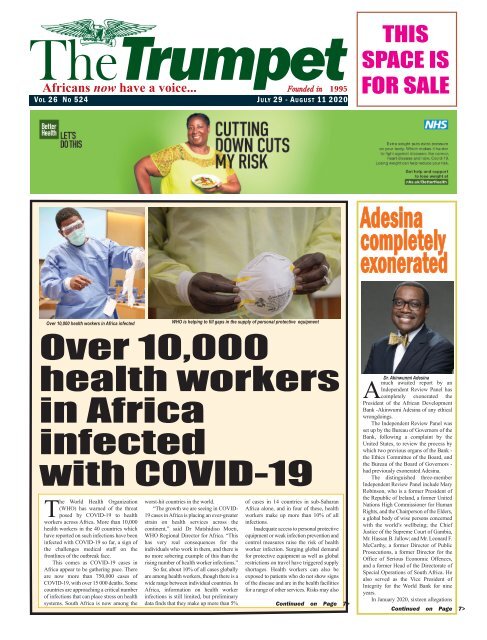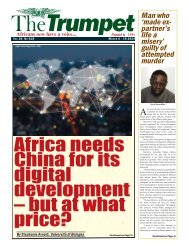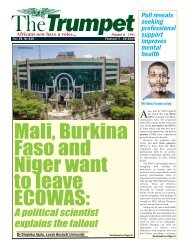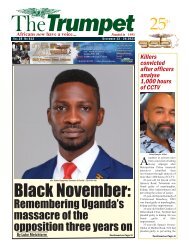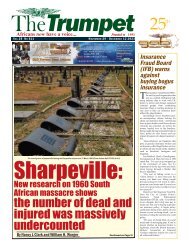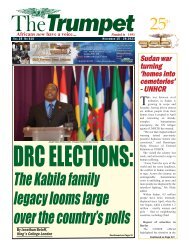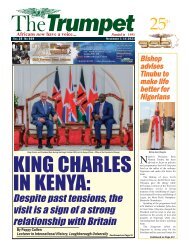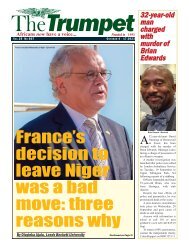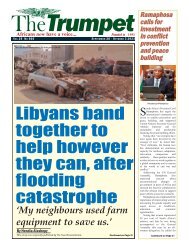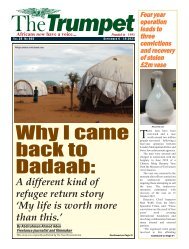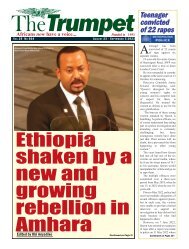The Trumpet Newspaper Issue 524 (July 29 - August 11 2020)
Over 10,000 health workers in Africa infected with COVID-19
Over 10,000 health workers in Africa infected with COVID-19
Create successful ePaper yourself
Turn your PDF publications into a flip-book with our unique Google optimized e-Paper software.
<strong>The</strong><strong>Trumpet</strong><br />
Africans now have a voice... Founded in 1995<br />
V O L 26 N O <strong>524</strong> J U LY <strong>29</strong> - AU G U S T <strong>11</strong> <strong>2020</strong><br />
THIS<br />
SPACE IS<br />
FOR SALE<br />
Adesina<br />
completely<br />
exonerated<br />
Over 10,000 health workers in Africa infected<br />
WHO is helping to fill gaps in the supply of personal protective equipment<br />
Over 10,000<br />
health workers<br />
in Africa<br />
infected<br />
with COVID-19<br />
<strong>The</strong> World Health Organization<br />
(WHO) has warned of the threat<br />
posed by COVID-19 to health<br />
workers across Africa. More than 10,000<br />
health workers in the 40 countries which<br />
have reported on such infections have been<br />
infected with COVID-19 so far, a sign of<br />
the challenges medical staff on the<br />
frontlines of the outbreak face.<br />
This comes as COVID-19 cases in<br />
Africa appear to be gathering pace. <strong>The</strong>re<br />
are now more than 750,000 cases of<br />
COVID-19, with over 15 000 deaths. Some<br />
countries are approaching a critical number<br />
of infections that can place stress on health<br />
systems. South Africa is now among the<br />
worst-hit countries in the world.<br />
“<strong>The</strong> growth we are seeing in COVID-<br />
19 cases in Africa is placing an ever-greater<br />
strain on health services across the<br />
continent,” said Dr Matshidiso Moeti,<br />
WHO Regional Director for Africa. “This<br />
has very real consequences for the<br />
individuals who work in them, and there is<br />
no more sobering example of this than the<br />
rising number of health worker infections.”<br />
So far, about 10% of all cases globally<br />
are among health workers, though there is a<br />
wide range between individual countries. In<br />
Africa, information on health worker<br />
infections is still limited, but preliminary<br />
data finds that they make up more than 5%<br />
of cases in 14 countries in sub-Saharan<br />
Africa alone, and in four of these, health<br />
workers make up more than 10% of all<br />
infections.<br />
Inadequate access to personal protective<br />
equipment or weak infection prevention and<br />
control measures raise the risk of health<br />
worker infection. Surging global demand<br />
for protective equipment as well as global<br />
restrictions on travel have triggered supply<br />
shortages. Health workers can also be<br />
exposed to patients who do not show signs<br />
of the disease and are in the health facilities<br />
for a range of other services. Risks may also<br />
Continued on Page 7><br />
Dr. Akinwunmi Adesina<br />
Amuch awaited report by an<br />
Independent Review Panel has<br />
completely exonerated the<br />
President of the African Development<br />
Bank -Akinwumi Adesina of any ethical<br />
wrongdoings.<br />
<strong>The</strong> Independent Review Panel was<br />
set up by the Bureau of Governors of the<br />
Bank, following a complaint by the<br />
United States, to review the process by<br />
which two previous organs of the Bank -<br />
the Ethics Committee of the Board, and<br />
the Bureau of the Board of Governors -<br />
had previously exonerated Adesina.<br />
<strong>The</strong> distinguished three-member<br />
Independent Review Panel include Mary<br />
Robinson, who is a former President of<br />
the Republic of Ireland, a former United<br />
Nations High Commissioner for Human<br />
Rights, and the Chairperson of the Elders,<br />
a global body of wise persons concerned<br />
with the world’s wellbeing; the Chief<br />
Justice of the Supreme Court of Gambia,<br />
Mr. Hassan B. Jallow; and Mr. Leonard F.<br />
McCarthy, a former Director of Public<br />
Prosecutions, a former Director for the<br />
Office of Serious Economic Offences,<br />
and a former Head of the Directorate of<br />
Special Operations of South Africa. He<br />
also served as the Vice President of<br />
Integrity for the World Bank for nine<br />
years.<br />
In January <strong>2020</strong>, sixteen allegations<br />
Continued on Page 7>
Page2 <strong>The</strong><strong>Trumpet</strong> JULY <strong>29</strong> - AUGUST <strong>11</strong> <strong>2020</strong><br />
News<br />
Jailed for violent rape<br />
Aman has been sentenced<br />
after he was found guilty of<br />
beating and raping a<br />
woman.<br />
31-year-old Osman Suleyman of<br />
no fixed address was sentenced at<br />
Woolwich Crown Court to 16 years<br />
in prison and an extended five years<br />
on licence.<br />
In March, at the same court,<br />
Suleyman had been unanimously<br />
found guilty of two counts of rape,<br />
assault (ABH), threats to kill and<br />
false imprisonment.<br />
At the start of the trial he had<br />
pleaded guilty to one further count<br />
of ABH.<br />
<strong>The</strong> court heard how on 4<br />
October 2019, Suleyman and a<br />
number of others were out in<br />
Woolwich Town Centre.<br />
Amongst the group was a 23-<br />
year-old female, who was known to<br />
Suleyman.<br />
In the early hours of Saturday 5<br />
October, the group returned to a flat<br />
in Charlton, SE7. This was the home<br />
of one of Suleyman’s friends and<br />
Suleyman was temporarily staying<br />
at the premises.<br />
Up to this point the evening had<br />
been good-natured, however<br />
Suleyman’s mood began to change.<br />
He demanded the victim perform<br />
sexual acts on him as payment for<br />
drugs and alcohol he had bought<br />
and, when the victim refused,<br />
Suleyman became violent.<br />
He repeatedly struck her face<br />
using a knuckle duster and the<br />
sheath of a knife, and also kicked<br />
her. Suleyman then forced the<br />
victim to perform a sex act on him<br />
and he then raped her. Suleyman<br />
told the victim that if she were to tell<br />
the police, he would kill her.<br />
<strong>The</strong> victim suffered extensive<br />
injuries as a result of her ordeal,<br />
receiving cuts and bruises to her<br />
face and bruising to her body.<br />
Almost immediately, after<br />
leaving the address, the victim saw a<br />
friend who could see she was in<br />
distress and the friend called the<br />
police. Police attended and spoke to<br />
the victim, who was taken to<br />
hospital.<br />
Officers located the address<br />
where the offence happened and<br />
forced entry, Suleyman was present<br />
at the location and arrested.<br />
At the scene there were clear<br />
signs of disturbance with blood<br />
smeared on the walls and on a<br />
START YOUR OWN<br />
RECRUITMENT AGENCY<br />
As businesses begins to pick up, establishing your<br />
own recruitment agency will allow you to join<br />
several companies at the earliest stage.<br />
Recruitment agency gives you the flexibility and the<br />
opportunity of setting your own work balance.<br />
Set up and recruit for temporary, permanent and on<br />
contract basis.<br />
At Attop Group, we help to set up your own recruitment<br />
agency from A-Z.<br />
Have 100% ownership.<br />
Start building incredible turnover in your first year.<br />
Documentations and company website.<br />
Company policy.<br />
Business insurance.<br />
Have it set up to run by yourself or have team of<br />
recruiters to run it for you.<br />
Osman Suleyman<br />
kitchen door. <strong>The</strong>re was also<br />
clothing and bedding items in a<br />
washing machine which appeared to<br />
be bloodstained.<br />
In interview Suleyman simply<br />
said he had not raped or assaulted<br />
Links to potential clients.<br />
Recruitment to Recruitment settings (Rec-to-Rec).<br />
Recruitment training if required.<br />
Several ways to get a new client.<br />
Guide to employment law.<br />
Links to quick invoice payment.<br />
Ongoing support and many more.<br />
With our support, it's a lot easier than you might think.<br />
Invest in your future and contact us today for your free<br />
consultation on 020 3633 0617 or 07955 887 884.<br />
Alternatively, you can text RECRUITMENT to 07955 887<br />
884 and one of our representatives will get back to you.<br />
anyone and answered “no<br />
comment” to all further questions<br />
put to him.<br />
Detective Constable Ben<br />
Harrington of the South East<br />
Command Unit said: “This was a<br />
horrible crime and the victim was<br />
subjected to a dreadful ordeal.<br />
Thankfully she has been able to<br />
recover from her injuries, but the<br />
impact of such a crime goes beyond<br />
the physical injury.<br />
“<strong>The</strong> Met recognises the<br />
traumatic nature of such crimes and<br />
that is why victims are supported by<br />
specialist officers. I hope that seeing<br />
the man responsible brought to<br />
justice will help her recovery.<br />
“Suleyman is a violent man and<br />
the jury found him unanimously<br />
guilty on all charges. This is<br />
certainly one of the most shocking<br />
cases I have ever had to deal with.<br />
<strong>The</strong> violence used was appalling.<br />
Suleyman now faces a long term in<br />
prison for his crime; it is thoroughly<br />
deserved.<br />
Do you have land in Nigeria that you want to develop?<br />
We (www.ukuldacoop.org) are a UK-based Nigeria-Mass-Housing-cum-<br />
Infrastructure-Development-Focused Cooperative.<br />
Do you have land with "C of O" in a good location in Nigeria that you want to<br />
develop? We may be the "JV" (Joint Venture)<br />
Funding and Technical partners you need.<br />
Contact us: +44 (0) 7956 675412<br />
info@ukuldacoop.org / www.ukuldacoop.org
JULY <strong>29</strong> - AUGUST <strong>11</strong> <strong>2020</strong> <strong>The</strong><strong>Trumpet</strong><br />
Page3
Page4<br />
<strong>The</strong><strong>Trumpet</strong><br />
JULY <strong>29</strong> - AUGUST <strong>11</strong> <strong>2020</strong><br />
<strong>The</strong><strong>Trumpet</strong> Group<br />
News<br />
Renewed murder appeal as<br />
Crimestoppers offers<br />
Tel: 020 8522 6600<br />
Field: 07956 385 604<br />
E-mail:<br />
info@the-trumpet.com<br />
<strong>The</strong><strong>Trumpet</strong>Team<br />
PUBLISHER / EDITOR-IN-CHIEF:<br />
’Femi Okutubo<br />
CONTRIBUTORS:<br />
Moji Idowu, Ayo Odumade,<br />
Steve Mulindwa<br />
SPECIAL PROJECTS:<br />
Odafe Atogun<br />
John-Brown Adegunsoye (Abuja)<br />
DESIGN:<br />
Xandydesigns@gmail.com<br />
ATLANTA BUREAU CHIEF:<br />
Uko-Bendi Udo<br />
3695 F Cascade Road #2140 Atlanta,<br />
GA 30331 USA<br />
Tel: +1 404 889 3613<br />
E-mail: uudo1@hotmail.com<br />
BOARD OF CONSULTANTS<br />
CHAIRMAN:<br />
Pastor Kolade Adebayo-Oke<br />
MEMBERS:<br />
Tunde Ajasa-Alashe<br />
Allison Shoyombo, Peter Osuhon<br />
<strong>The</strong><strong>Trumpet</strong> (ISSN: 1477-3392)<br />
is published in London fortnightly<br />
Advertising:<br />
020 8522 6600<br />
THINKING<br />
OF<br />
WRITING<br />
A BUSINESS<br />
PLAN?<br />
We can help you develop a<br />
professional business plan<br />
from only £250.<br />
For more information, contact us<br />
at 07402792146 or email us at:<br />
tolu.oyewole@consultant.com<br />
£10,000 reward<br />
Detectives investigating the<br />
murder of Alexander Kareem<br />
in Shepherds Bush have made<br />
a renewed appeal for information as<br />
Crimestoppers announce a £10,000<br />
reward.<br />
<strong>The</strong> independent charity<br />
Crimestoppers is offering a reward of<br />
up to £10,000 for information that they<br />
receive anonymously that leads to the<br />
arrest of the person or people<br />
responsible for the murder of<br />
Alexander Kareem.<br />
Police continue to investigate the<br />
murder of Alexander, 20, who was<br />
found with fatal gunshot wounds at<br />
00:40hrs on Monday 8 June, on Askew<br />
Road, Shepherds Bush. Key lines of<br />
enquiry continue to centre on a vehicle,<br />
a white Range Rover, which was found<br />
burned out just 25 minutes after police<br />
were called to the scene, on nearby<br />
Ascott Avenue.<br />
DCI Wayne Jolley, said: “We<br />
continue to work round the clock to<br />
find answers for Alexander’s friends<br />
and family. We are appealing to those<br />
who have information to call and say<br />
what you know. <strong>The</strong>re are people out<br />
there who know who was in the white<br />
Range Rover that night. You are<br />
protecting someone who has committed<br />
a terrible crime and needs to be brought<br />
to justice. Please think of Alex’s family<br />
and friends who deserve to know what<br />
happened to him.<br />
“We are hoping this significant<br />
reward, put up by Crimestoppers, will<br />
encourage people to come forward. It is<br />
100% anonymous.<br />
“<strong>The</strong>re continues to be additional<br />
patrols in the area and we want to<br />
reassure the public that we will do all<br />
we can to bring those responsible to<br />
justice.”<br />
Alexa Loukas, London Regional<br />
Manager at the charity Crimestoppers,<br />
said: “Our thoughts are very much with<br />
the family and friends of Alexander<br />
after this tragic murder. He had a great<br />
future ahead of him and his life has<br />
been senselessly cut short. If you know<br />
who was responsible or have any<br />
information, no matter how small,<br />
please speak up and tell Crimestoppers.<br />
This is your opportunity to do the right<br />
thing. We are offering this reward<br />
because his family deserve to see<br />
justice for Alexander.”<br />
Crimestoppers, as an independent<br />
charity, keeps its promise of 100%<br />
anonymity each and every day to those<br />
who trust them with their crime<br />
information. Share what you know by<br />
calling their UK Contact Centre on<br />
0800 555 <strong>11</strong>1, 24 hours a day, seven<br />
days a week or use the website’s<br />
anonymous online form at<br />
www.crimestoppers-uk.org. No one<br />
will ever know your identity. <strong>The</strong>y<br />
cannot trace your call or track your IP<br />
address and will never ask for or record<br />
any personal information.<br />
If you’re a young person, you can<br />
also report anonymously via<br />
Crimestoppers’ dedicated youth service<br />
by visiting Fearless.org. Your<br />
information could also keep someone<br />
else safe from future harm.<br />
* Note: Information passed directly<br />
to police will not qualify for the reward.<br />
Only information passed to<br />
Crimestoppers’ using the untraceable<br />
anonymous online form at<br />
www.crimestoppers-uk.org or via the<br />
0800 555 <strong>11</strong>1 freephone number will<br />
qualify<br />
Bubble In Christ Music Band<br />
For your Music band with<br />
classic rendition for all<br />
occasions, with traditional,<br />
contemporary African<br />
international and Gospel filled<br />
with professional decent<br />
Presentation.<br />
More Musicians, Singers,<br />
Instrumentalists, handy men,<br />
Music directors band coordinators,<br />
Audio and/or video<br />
technicians, Drivers,<br />
Marketing Personnel are<br />
welcome.<br />
Contact: Olugbenga on<br />
07438 264613<br />
CHERUBIM & SERAPHIM MOVEMENT CHURCH<br />
Amazing Grace District -London Branch 2<br />
God’s Promises<br />
never fail:<br />
* Before they call I<br />
will answer; while<br />
they are still<br />
speaking I will hear<br />
(Isaiah 65: 24)<br />
Alexander Kareem<br />
WEEKLY DELIVERANCE SERVICE<br />
Deliverance: Every Wednesday<br />
Time: 6.30pm – 7pm (Individual Prayer & Counselling)<br />
Midweek Church Service: 7pm – 9pm<br />
Venue: Orange Room, Albany <strong>The</strong>atre, Douglas Way,<br />
London SE8 4AG<br />
Other Service: Sunday Thanks giving <strong>11</strong>am – 1.30pm<br />
* He will call upon me and I<br />
will answer him: I will be<br />
with him in trouble, I will<br />
deliver him and honour him<br />
(Psalm 91: 15)<br />
For further information, contact - Church Secretary: S/M/I/I (Dr) I Oni-Owoyemi 07788 745231 Or<br />
Church Elders: S/A T Owoyemi 07956 996689 or / M/S/A W Ojomo 07939 836499 or / Apostle T Gbolasere 07484 243990<br />
Email: amazinggracebranch2@gmail.com
JULY <strong>29</strong> - AUGUST <strong>11</strong> <strong>2020</strong> <strong>The</strong><strong>Trumpet</strong><br />
Page5
Page6 <strong>The</strong><strong>Trumpet</strong> JULY <strong>29</strong> - AUGUST <strong>11</strong> <strong>2020</strong><br />
News<br />
Burkina Faso: Tackling COVID-19<br />
fear and stigma<br />
Tackling COVID-19<br />
fear and stigma<br />
Hesitancy to get tested, avoiding<br />
contact tracers or wariness of<br />
what the neighbours will say: the<br />
COVID-19 pandemic has triggered a<br />
variety of reactions among some<br />
Ouagadougou residents that have<br />
complicated timely response.<br />
When the country’s COVID-19 rapid<br />
response team tried to reach out to a man<br />
who had been in contact with a patient<br />
taken for treatment at a Ouagadougou<br />
hospital, he shifted from refusing to take<br />
calls, to promising to show up for testing<br />
and to suggesting that the team comes to<br />
his house only at night.<br />
“He said that since we went to his<br />
house to take samples, even before the<br />
test results were known, no-one came to<br />
visit them again. Everybody was staring<br />
at them strangely. It was really difficult<br />
for them,” says Safiatou Ouedraogo,<br />
coordinator of the rapid response team at<br />
the Centre Medical Urbain in<br />
Ouagadougou.<br />
COVID-19 is a new virus and the fear<br />
of the unknown drives stigma about the<br />
disease and can cause people to hide their<br />
illness. Fear can also hold people back<br />
from seeking immediate health care or<br />
observing preventive measures.<br />
Days of determined negotiations is<br />
what it sometimes takes for response<br />
teams to visit families when a family<br />
member tests positive for the virus. But<br />
even then, some refuse to reveal their<br />
addresses, preferring to turn up at a<br />
treatment centre instead. “Due to stigma,<br />
people would rather not have the rapid<br />
response team show up at their house,”<br />
Ouedraogo explains.<br />
She recounts that among some<br />
families, each visit requires fresh<br />
negotiations to allow the response team<br />
to follow up on contacts or disinfect their<br />
compound. “We realized that the<br />
neighbours’ reaction towards the<br />
(affected) family every time we came to<br />
take samples opened new wounds,” she<br />
says.<br />
Once a home guard who contracted<br />
COVID-19 refused to give his own<br />
address, preferring that of his work<br />
station and attempts to reach the people<br />
he might have come in contact with were<br />
fruitless, recounts Ouedraogo.<br />
Barthelemy Marie Ludovic<br />
Ouedraogo, a School Principal and a<br />
Cleric, says while suffering persistent<br />
fever he began taking precautions such as<br />
avoiding sharing utensils and attending<br />
mass with colleagues, but he did not<br />
reveal to them that he was feeling ill until<br />
he went to an isolation centre. “I was<br />
really worried for them.”<br />
Providing the right information about<br />
COVID-19, addressing misinformation<br />
and rumours, as well as building trust<br />
with communities, are critical in<br />
addressing stigma. In addition,<br />
communicating with empathy to patients<br />
of COVID-19 is as important as engaging<br />
with community, religious leaders and<br />
other influencers to relay the right<br />
information and help reduce fear and how<br />
people perceive those who are ill with the<br />
virus.<br />
Setting up centres where people who<br />
suspect they have caught the virus can go<br />
for testing rather than have home visits<br />
by the rapid response teams could ease<br />
the stigma and fear, Safiatou Ouedraogo<br />
suggests, also pointing out that increasing<br />
public education campaigns and the use<br />
of the psychosocial care units in health<br />
centres are helpful steps.<br />
<strong>The</strong> World Health Organization<br />
(WHO) is working with the government<br />
to provide guidance to tackle stigma as<br />
well as support other aspects of the<br />
COVID-19 response, says Dr Fousseni<br />
Dao, who represents WHO in the national<br />
COVID-19 response cluster in charge of<br />
treatment.<br />
Dr Brice Bicaba, the national<br />
Anew report shows that people in<br />
some 25 countries are set to<br />
face devasting levels of hunger<br />
in coming months due to the fallout<br />
from the COVID-19 pandemic. While<br />
the greatest concentration of need is in<br />
Africa, countries in Latin America and<br />
the Caribbean, and in the Middle East<br />
and Asia – including middle-income<br />
countries - are also being ravaged by<br />
crippling levels of food insecurity,<br />
according to the Early Warning Analysis<br />
of Acute Food Security Hotspots,<br />
compiled by the World Food<br />
Programme and the Food and<br />
Agriculture Organisation of the United<br />
Nations.<br />
“Three months ago at the UN<br />
Security Council, I told world leaders<br />
that we ran the risk of a famine of<br />
biblical proportions,” said WFP<br />
Executive Director David Beasley.<br />
“Today, our latest data tell us that, since<br />
then, millions of the world’s very<br />
poorest families have been forced even<br />
closer to the abyss. Livelihoods are<br />
being destroyed at an unprecedented<br />
rate and now their lives are in imminent<br />
danger from starvation. Make no<br />
mistake – if we do not act now to end<br />
this pandemic of human suffering,<br />
many people will die”<br />
To prevent the worst, WFP is scaling<br />
up to provide food assistance to an<br />
COVID-19 response coordinator,<br />
acknowledges that not only are patients<br />
stigmatized, health workers, especially<br />
those in COVID-19 treatment centres, are<br />
also shunned by their communities who<br />
fear that their jobs have put them at a<br />
higher risk of contracting the virus. He<br />
also points out that involving people who<br />
unprecedented 138 million people who<br />
face desperate levels of hunger as the<br />
pandemic tightens its grip on some of<br />
the most fragile countries on earth.<br />
<strong>The</strong> cost of WFP’s response to this<br />
burgeoning food insecurity is estimated<br />
at US$ 4.9 billion, with an additional<br />
$500 million being earmarked to<br />
prevent the outbreak of famine in<br />
countries most at risk.<br />
This represents more than half of the<br />
updated COVID-19 Global<br />
Humanitarian Response Plan, the<br />
largest appeal in the UN’s history,<br />
launched for more than US$ 10 billion.<br />
<strong>The</strong> plan covers wide-ranging<br />
humanitarian needs in more than 60<br />
have recovered from COVID-19 in<br />
public information and education<br />
campaigns as well as providing<br />
psychosocial support are some of the<br />
measures being deployed against stigma.<br />
“We’re hopeful that all this will help<br />
reduce the problem,” Dr Bicaba said.<br />
Hunger due to soar in 25<br />
countries<br />
Women in Nigeria collect food vouchers as part of a programme to support families struggling under<br />
the COVID-19 lockdown. Photo - WFP, Damilola Onafuwa<br />
countries, many of them already reeling<br />
from the impact of conflict, climate<br />
change and economic crisis.<br />
<strong>The</strong> number of acute food insecure<br />
people in these at-risk countries could<br />
increase from an estimated 149 million<br />
pre-COVID-19 to 270 million before<br />
the end of the year if life-saving<br />
assistance is not provided urgently.<br />
Recent estimates also suggest that up to<br />
6,000 children could die every day from<br />
preventable causes over the next six<br />
months as a result of pandemic-related<br />
disruptions to essential health and<br />
nutrition services.
News<br />
JULY <strong>29</strong> - AUGUST <strong>11</strong> <strong>2020</strong> <strong>The</strong><strong>Trumpet</strong> Page7<br />
Over 10,000 health workers in Africa<br />
infected with COVID-19<br />
Continued from Page 1<<br />
arise when health personnel are repurposed for<br />
COVID-19 response without adequate briefing,<br />
or because of heavy workloads which result in<br />
fatigue, burnout and possibly not fully applying<br />
the standard operating procedures.<br />
In many African countries infection<br />
prevention and control measures aimed at<br />
preventing infections in health facilities are still<br />
not fully implemented. When WHO assessed<br />
clinics and hospitals across the continent for<br />
these measures, only 16% of the nearly 30,000<br />
facilities surveyed had assessment scores above<br />
75%. Many health centres were found to lack<br />
the infrastructure necessary to implement key<br />
infection prevention measures, or to prevent<br />
overcrowding. Only 7.8% (2213) had isolation<br />
capacities and just a third had the capacity to<br />
triage patients.<br />
“One infection among health workers is one<br />
too many,” said Dr Moeti. “Doctors, nurses and<br />
other health professionals are our mothers,<br />
brothers and sisters. <strong>The</strong>y are helping to save<br />
lives endangered by COVID-19. We must make<br />
sure that they have the equipment, skills and<br />
information they need to keep themselves, their<br />
patients and colleagues safe.”<br />
WHO has been working closely with health<br />
ministries to reduce health worker infections<br />
since the outbreak began. <strong>The</strong> Organization has<br />
trained more than 50,000 health workers in<br />
Africa in infection prevention and control, with<br />
plans to train over 200,000 more, as well as<br />
providing guidance documents and guidelines<br />
on best care practices and the most up-to-date<br />
treatment regimes.<br />
WHO is also helping to fill gaps in the<br />
supply of personal protective equipment.<br />
Currently, 41 million items of personal protective<br />
equipment are ready to ship from China to cover<br />
the needs of 47 African countries. Shipments for<br />
an initial set of 23 African countries are planned<br />
to start during this weekend.<br />
As a result of concerted efforts by WHO and<br />
partners, some African countries have managed<br />
to reduce health worker infections<br />
considerably. For example, two months ago over<br />
Adesina completely exonerated<br />
16% of COVID-19 infections in Sierra Leone<br />
were among health workers. <strong>The</strong> figure has now<br />
dropped to 9%. Cote d’Ivoire has reduced the<br />
proportion of infections among health workers<br />
from 6.1% to 1.4%. Scaling up infection<br />
prevention and control measures can further<br />
reduce infections among health workers.<br />
Dr Moeti spoke about health worker<br />
infections in Africa during a virtual press<br />
conference organized by APO Group. She was<br />
joined by Hon Dr Léonie Claudine Lougue,<br />
Minister of Health of Burkina Faso; Hon Dr<br />
Alpha T. Wurie, Minister of Health and<br />
Population of Sierra Leone; and Dr Jemima A.<br />
Dennis-Antwi, International Maternal Health &<br />
Midwifery Specialist.<br />
Continued from Page 1<<br />
of ethical misconduct were levelled against<br />
Adesina by a group of whistleblowers. <strong>The</strong><br />
allegations which were reviewed by the Bank’s<br />
Ethics Committee of the Board of Directors in<br />
March, were described as “frivolous and without<br />
merit.” <strong>The</strong> findings and rulings of the Ethics<br />
Committee were subsequently upheld by the<br />
apex Bureau of the Board of Governors in May,<br />
which cleared Adesina of any wrongdoing.<br />
<strong>The</strong> report of the Independent Review<br />
Panel states that it “concurs with the (Ethics)<br />
Committee in its findings in respect of all the<br />
allegations against the President and finds that<br />
they were properly considered and dismissed<br />
by the Committee.”<br />
<strong>The</strong> Panel once again vindicates Adesina<br />
and states, “It has considered the President’s<br />
submissions on their face and finds them<br />
consistent with his innocence and to be<br />
persuasive.”<br />
<strong>The</strong> conclusions of the Independent<br />
Review Panel are decisive and now clear the<br />
way for Governors of the Bank to re-elect<br />
Adesina to a second five-year term as President<br />
during annual meetings of the Bank scheduled<br />
for <strong>August</strong> 25-27.<br />
Adesina is a highly decorated and<br />
distinguished technocrat and globally-respected<br />
development economist. He was awarded the<br />
prestigious World Food Prize in 2017 and the<br />
Sunhak Peace Prize in 2019 for global leadership<br />
in agriculture and for good governance.<br />
Since taking over the reins of the Bank in<br />
2015, he has introduced several innovative<br />
reforms including a High5 development<br />
strategy; a restructuring of the bank including<br />
setting up offices in several African nations to<br />
get closer to its clients; an Africa Investment<br />
Forum that has attracted $79 billion in<br />
investment interests into projects in Africa<br />
between 2018 and 2019. He successfully led a<br />
historic General Capital Increase campaign that<br />
culminated in the Bank’s shareholders raising<br />
the institution’s capital from $93 billion to $208<br />
billion, in October 2019.<br />
In June and <strong>July</strong> respectively, global credit<br />
ratings agencies Standard and Poors and Fitch<br />
Ratings both affirmed the ‘AAA’ rating of the<br />
Bank, with stable outlook.<br />
Several Governors of the Bank speaking<br />
off the record, say it is now time to put recent<br />
events in the past; provide the Bank’s President<br />
with full support; and bolster the Bank’s efforts<br />
on Africa’s critical development issues.
Page8 <strong>The</strong><strong>Trumpet</strong> JULY <strong>29</strong> - AUGUST <strong>11</strong> <strong>2020</strong><br />
Opinion<br />
NDDC and other stories<br />
It is a show of shame isn’t it, what is<br />
going on at the Niger Delta<br />
Development Commission (NDDC)?<br />
Established in the year 2000 to assuage the<br />
fears of the people of the Niger Delta and<br />
address their concerns about the lack of<br />
infrastructural development in the region,<br />
despite the region’s contributions to the<br />
sustenance of Nigeria, it is sad to see how<br />
like all good initiatives gone bad in<br />
Nigeria, this interventionist agency has<br />
become, or has been exposed as a festering<br />
sore upon the wound of the Niger Delta.<br />
From personality clashes to sordid tales of<br />
mismanagement of funds, contractors that<br />
collect mobilization fees and simply take<br />
a walk, politicians in the National<br />
Assembly feeding fat on Niger Delta<br />
resources, and reports of terrifying<br />
wasteful expenditure and the conversion of<br />
every event or situation: graduation<br />
ceremonies and even COVID-19 into an<br />
opportunity to empty the people’s till, the<br />
stench from the NDDC stinks to the<br />
heavens. In the past week, we have been<br />
treated to the kind of melodrama an artist<br />
may never have imagined, complete with<br />
the stuff of a fainting fit, a failed romantic<br />
attempt, a woman scorned, and hell<br />
breaking loose and a once self-styled<br />
uncommon Governor as the deutragonist.<br />
It is this latter part of the plot that has<br />
excited, amused and fascinated Nigerians.<br />
<strong>The</strong> protagonist is Joi Nunieh, the former<br />
Acting Managing Director of the Interim<br />
Management Committee (IMC) of the<br />
NDDC (October 2019 - February <strong>2020</strong>)<br />
who left the commission rather abruptly<br />
due to a yet unproven allegation around<br />
and about her NYSC certificate and socalled<br />
“insubordination.” In the course of<br />
a forensic audit of the agency ordered by<br />
President Muhammadu Buhari, it is<br />
noteworthy that all the hidden corpses in<br />
the NDDC especially within the last one<br />
year began to show up, and some of those<br />
ghosts emerged in the form of financial<br />
sleaze and broken alliances and failed<br />
relationships. <strong>The</strong> supervising Minister of<br />
the Commission, the Minister of Niger<br />
Delta Affairs, Senator Godswill Akpabio, a<br />
once powerful PDP chieftain, turned an<br />
APC floor member, went on television to<br />
offer his perspective on what transpired at<br />
the NDDC (he must be regretting doing<br />
so); rather than address the issues, he<br />
launched an attack on Joi Nunieh, who<br />
worked briefly as Acting Chairman of the<br />
NDDC.<br />
He complained about how the lady had<br />
married four husbands and called on those<br />
four men, who, if they exist at all, have<br />
lent themselves common sense and stayed<br />
off the radar. <strong>The</strong> Minister also made an<br />
allusion to Joi Nunieh’s state of health. Of<br />
course, she didn’t take it lying low. She<br />
seized the occasion with every ounce of<br />
oxygen in her body and smashed the table<br />
on which Akpabio leaned his bulky frame<br />
in the studio. In the course of her now<br />
famous interview on Arise TV, we were<br />
treated to the sub-plot of how Akpabio<br />
failing to dictate to her or control her<br />
actions adopted a “Plan B,” which is<br />
basically a plan to “entangle” her in “the<br />
other room.” She disclosed that what the<br />
“uncommon former Governor” from<br />
Akwa Ibom State got in response was an<br />
“uncommon slap in the face.” It must have<br />
been one of those hot, dirty, blinding slaps<br />
that result in a momentary loss of vision<br />
and a loud scream of Ye!. Akpabio as<br />
Governor used to refer to Akwa Ibom as<br />
“Gilgal.” His current travail is like a<br />
journey from Gilgal to Golgotha. He<br />
insists that Joi Nunieh is lying. He says he<br />
has asked his lawyers to go to court.<br />
You probably know the rest of the<br />
story: how things went downhill<br />
afterwards: the attempt to arrest Joi Nunieh<br />
at her Port Harcourt residence, a<br />
detachment of about 50 policemen<br />
knocking on the gates, smashing doors as<br />
Joi Nunieh<br />
if they were after a Colombian drug lord,<br />
Governor Nyesom Wike’s ironic,<br />
swashbuckling gallantry (can you imagine<br />
a PDP Governor protecting an APC<br />
member from members of her own<br />
party?), the sordid spectacle of the current<br />
Acting Chairman of the NDDC, Professor<br />
Keme Pondei walking out on the House of<br />
Representatives Committee on the NDDC,<br />
after practically accusing the Chair of the<br />
Committee of being an interested party in<br />
the matter, and the same Committee<br />
issuing a warrant of arrest to call Pondei to<br />
order. Earlier, the same Professor Keme<br />
Pondei allegedly disclosed how members<br />
of the IMC which he leads spent N1.8<br />
billion on themselves alone as COVID<br />
palliative within three months! When he<br />
eventually showed up at the House of<br />
Representatives yesterday, and he was<br />
reminded that he and his colleagues had<br />
helped themselves to funds that were not<br />
covered in the approved NDDC Budget,<br />
he started fanning himself in an airconditioned<br />
room and before anyone knew<br />
it, he slumped atop his table! His<br />
detractors argue that he was merely<br />
playing his role: an Acting MD, acting out<br />
a scene in the NDDC drama.<br />
Stakeholders within the NGO<br />
community who claim that they have been<br />
monitoring the NDDC for years, in fact,<br />
suggest that we haven’t seen anything yet<br />
and that if a thorough forensic audit is<br />
conducted, Nigerians will be shocked<br />
beyond their marrows. But can anything<br />
be worse than what we have seen and<br />
heard so far? <strong>The</strong>se stakeholders also<br />
argue that all the drama that our eyes have<br />
seen so far is at best a distraction and an<br />
orchestrated cover up attempt. <strong>The</strong> only<br />
problem is that the Niger Delta NGO<br />
community has also been fingered in some<br />
of the stories for having received<br />
patronage from the NDDC for work not<br />
done. If indeed things get more curious, a<br />
list of beneficiary-NGOs may surface, and<br />
we may all get busy struggling to lift the<br />
veil. We should be watchful. A Professor<br />
slumped yesterday. Someone else could<br />
have a heart attack tomorrow!<br />
But where are the people of the Niger<br />
Delta in all of this? What are their views<br />
on the on-going controversy? <strong>The</strong>y are the<br />
ones who have been short-changed the<br />
most. <strong>The</strong> NDDC, originally OMPADEC,<br />
Godswill Akpabio<br />
was part of a series of policy measures<br />
including derivation, ecological fund, and<br />
infrastructure development plans to<br />
address the marginalization of the Niger<br />
Delta people, check youth restiveness in<br />
the region and promote peace and stability.<br />
Since inception, the NDDC has been<br />
managed by persons from the Niger Delta.<br />
A Ministry of the Niger Delta was also<br />
created, and to date, only persons from the<br />
Niger Delta have headed that Ministry.<br />
And yet all of these issues! <strong>The</strong> usual<br />
tendency is to say that the NDDC was<br />
designed to fail, but that is certainly not<br />
true. <strong>The</strong> goal was principled – to bring<br />
development to the Niger Delta. It will<br />
also be incorrect to say that the people<br />
have not seen any development at all. In<br />
1999, parts of the Niger Delta were in a<br />
complete mess. I recall visiting Yenagoa in<br />
2000. <strong>The</strong> Governor then was the late<br />
Governor-General of the Niger Delta, the<br />
famous Diepreye Alamiyesiegha.<br />
Yenagoa, the capital of Bayelsa State had<br />
only one visible road, which looked like<br />
something constructed in the 1960s. I saw<br />
one bank: the defunct All States Trust, I<br />
believe. And one fuel station with a<br />
broken, solitary, pump. And there was a<br />
higher education college whose female<br />
students were friendly and hospitable<br />
beyond comparison! Today, Yenagoa looks<br />
different, and the same may be said of<br />
other areas of the Niger Delta. <strong>The</strong><br />
improvement does not go far enough,<br />
however, because the major threats to the<br />
people’s lives: critical infrastructure like<br />
the East-West Highway, environmental<br />
BY REUBEN ABATI<br />
crisis, and unemployment remain visible.<br />
Governors of the Niger Delta since<br />
1999 may claim credit for this<br />
improvement that we have seen but the<br />
perception in Nigeria is that the<br />
OMPADEC/NDDC intervention has<br />
helped to some degree resulting in the<br />
request by other regions for a similar<br />
intervention agency. Nonetheless, recent<br />
revelations that contractors and officials of<br />
the NDDC have been busy pilfering the<br />
funds of the Commission is at best<br />
stupefying, the sheer scale of it is<br />
benumbing. <strong>The</strong> N81.5 billion that was<br />
allegedly diverted within two months<br />
sounds like enough money to transform<br />
the health sector in parts of the Niger Delta<br />
in a season of COVID-19. So, this is not<br />
the time for the people of the Niger Delta<br />
to make the usual defensive point that<br />
anybody from the Niger Delta is entitled<br />
to take Niger Delta money. <strong>The</strong> view that<br />
“it is our money taken by our children” is<br />
unacceptable. <strong>The</strong> Niger Delta struggle<br />
was based on the ideals of justice, equity,<br />
development and progress, no latter-day<br />
revisionist should impose on the people of<br />
the Niger Delta, a Barkin Zuwo<br />
philosophy. I bring this up because I have<br />
read some comments by some members of<br />
the Niger Delta elite insisting that the big<br />
issue is that the NDDC has not been<br />
properly funded and that the thing to do is<br />
to release all outstanding funds to the<br />
Commission. Is that why the trillions in<br />
contention had to be mismanaged? Is that<br />
the issue on the table? <strong>The</strong>re should be a<br />
more robust conversation about the<br />
development process in the Niger Delta<br />
beyond the confusing argument that this is<br />
a conflict between “a political Niger<br />
Delta” and “a geographical Niger Delta”<br />
or that the only way forward is to throw in<br />
more money.<br />
President Muhammadu Buhari has<br />
ordered two major audits in recent times:<br />
the audit of the Niger Delta Development<br />
Commission and that of the Economic and<br />
Financial Crimes Commission (EFCC).<br />
Both should be taken as a personal<br />
reaffirmation of his commitment to one of<br />
the major planks of his proposed legacy at<br />
the inception of his administration in 2015:<br />
that is the fight against corruption. But<br />
beyond the anti-corruption battle, there is<br />
an emerging downside to the Buhari<br />
administration: the constant bickering, the<br />
cult of personality and the externalization<br />
of battles over territory within the<br />
government. In a Presidential democracy,<br />
a President appoints persons to assist him,<br />
Continued on Page 9
Opinion<br />
JULY <strong>29</strong> - AUGUST <strong>11</strong> <strong>2020</strong><br />
<strong>The</strong><strong>Trumpet</strong><br />
After COVID-19, will Africa catch up,<br />
stand still or fall further behind?<br />
Page9<br />
At one time or another, nations and<br />
individuals confront crisis points<br />
– moments of existential<br />
challenge that also open up new<br />
possibilities. African countries, at just<br />
such a crisis point as a result of the novel<br />
coronavirus, face three possible outcomes<br />
post-pandemic: play catch-up, stand still<br />
or fall even further behind the<br />
industrialized world [1].<br />
With this crisis comes an economic<br />
disruption of unprecedented proportion.<br />
To avoid falling further behind, Africans<br />
must narrow the scientific and technology<br />
gap and leverage our comparative<br />
advantages. It is time for Africa to adopt<br />
radical technological and policy<br />
innovations. <strong>The</strong> global economy is<br />
increasingly driven by science-based and<br />
patent-intensive systems. Through<br />
investments in molecular technology, AI<br />
and other technologies the 4 th industrial<br />
Revolution is ushering in, they can<br />
overcome existing barriers to entry.<br />
Catching up<br />
India offers an example of how to<br />
catch up. <strong>The</strong>re, two key developments in<br />
the sixties and seventies sharply altered<br />
the country’s trajectory.<br />
In 1965, following past famines crises,<br />
India imported 250 tons of high-yielding<br />
Mexican dwarf wheat seed varieties for<br />
wide-scale testing on farms. Early positive<br />
results led to the importation of a further<br />
18,000 tons. Along with the use of<br />
irrigation and other innovations adopted<br />
by farmers, Indian agriculture was<br />
transformed.<br />
Within five years, India produced<br />
enough grains to support its population<br />
and, even following a drought in 1979,<br />
had no need to import grain. Overall, the<br />
country’s wheat and rice production<br />
tripled between 1961 and 1980. Radical<br />
policy response to famine-induced crisis<br />
birthed the Green Revolution.<br />
India’s pharmaceutical sector also<br />
experienced a crisis-inflection point in<br />
1972, when the government passed the<br />
Patents Act, which enabled domestic firms<br />
to replicate drugs that had been patented<br />
by multinational corporations. Local<br />
companies have since dominated the<br />
global market through reverseengineering<br />
leading to generic medicines<br />
that are far more affordable than patented<br />
ones. Radical policy response to crisisinduced<br />
shortage of medicines<br />
transformed Indian Pharma.<br />
Falling behind<br />
Africa processes a very small<br />
proportion of its agricultural produce. We<br />
continue to export raw commodities like<br />
cocoa, timber and cotton that others<br />
process and re-sell to Africa at a much<br />
higher valuation. Our continent also has<br />
sufficient sunlight, wind and hydropower,<br />
technologies that can power<br />
Africa sustainably, and other regions<br />
besides.<br />
Critically, Africa also has a median age<br />
of 19, far younger than that of any<br />
continent, a potential demographic<br />
dividend of young innovation-driven<br />
workers and a relatively small proportion<br />
of elderly workers. This human capital<br />
will foster Africa’s forging ahead.<br />
If we fail to harness new technologies<br />
and leverage our strengths to create<br />
abundant high paying manufacturing and<br />
service jobs to compete within global<br />
supply chains, then we risk falling even<br />
farther behind on socioeconomic terms.<br />
Forging ahead<br />
To forge ahead, Africa will first have<br />
to return swiftly to economic growth.<br />
Beyond that, diversifying our economies<br />
will be critical, particularly for those<br />
countries that are dependent on one or two<br />
mineral resources or commodities. Above<br />
all, African companies must deepen<br />
capacities for competitive advantage to<br />
master new technologies in emerging<br />
sectors.<br />
African innovators need a robust<br />
innovation framework and a better<br />
enabling environment to master the socalled<br />
industrial biology embedded in the<br />
4 th Industrial Revolution. For instance,<br />
firms in Morocco, Senegal, Nigeria and<br />
some other African countries have<br />
developed COVID-19 test kits but face a<br />
difficult path to commercialization.<br />
China’s response to the COVID-19<br />
pandemic is once more illustrative of a<br />
dynamic industrial policy. It is targeting<br />
ambitious increases in domestic firms’<br />
share of the global medical supplies<br />
market. <strong>The</strong> government has provided<br />
cheap land for factories subsidized loans,<br />
helps them to secure a supply chain of raw<br />
materials, and to stimulate domestic<br />
demand by incentivizing hospitals and<br />
companies to use their products.<br />
And there are powerful examples right<br />
here on the continent. South Africa<br />
successfully financed the production of<br />
<strong>The</strong> National Ventilator Project to address<br />
COVID-19, developing prototypes,<br />
securing component supply chains, and a<br />
manufacturing facility. <strong>The</strong> project owes<br />
its success in part to strong government<br />
support and broad coordination among<br />
economic and technological agencies. As<br />
with South Africa, the rest of the continent<br />
would benefit from strong innovation<br />
systems that are part of national budgeting<br />
and planning frameworks.<br />
African businesses have a critical role<br />
to play, but so do African leaders, who<br />
must strike a delicate balance between<br />
State intervention and open markets.<br />
African governments are best placed to<br />
identify market failures and opportunities,<br />
and devise policies and regulations that<br />
By Professor Banji<br />
Oyelaran-Oyeyinka<br />
benefit Africa’s private sector and its<br />
people.<br />
* Professor Banji Oyelaran-Oyeyinka,<br />
is the Senior Special Adviser on<br />
Industrialization to the President, AfDB,<br />
he is a Fellow of the Nigerian Academy of<br />
Engineering and Professorial Fellow,<br />
United Nations University.<br />
[1] <strong>The</strong> theory was mooted in a 1986<br />
paper by Moses Abramovitz who posited<br />
that countries with lagging productivity<br />
could grow rapidly and catch up with the<br />
leading economies by realizing their<br />
potential.<br />
NDDC and other stories<br />
Continued from Page 8<<br />
he delegates authority to them and they are<br />
required to help him achieve the objectives<br />
of his administration. Under President<br />
Buhari, the in-fighting among his team<br />
conveys the impression that many of his<br />
appointees are either not interested in his<br />
own objectives or they are on a frolic of<br />
their own. We have had the Director<br />
General of the Nigerians in Diaspora<br />
Commission at logger heads with the<br />
Minister of Communications over office<br />
space; Minister of Information vs. DG<br />
National Broadcasting Commission<br />
(NBC), Minister of Labour and<br />
Employment vs. MD NSITF, Joy Nunieh<br />
vs Godswill Akpabio; Minister of Health<br />
vs. Executive Secretary, NHIS, AGF<br />
Malami vs EFCC Chair Magu, DSS vs.<br />
EFCC, First Lady vs. Presidential<br />
aides…all fighting-to-finish as if “Oga is<br />
not around”. <strong>The</strong>y have done so much<br />
damage. Five years ago, the fear of<br />
Buhari’s war against corruption was the<br />
beginning of wisdom Today, his own<br />
appointees and political associates have<br />
messed up the message and strategy. <strong>The</strong><br />
economy is in bad shape. <strong>The</strong> war against<br />
terror is not working…<br />
Whatever is happening is a wake-up<br />
call and an opportunity for Mr. President<br />
to steady the ship. He needs to rescue his<br />
government from ambitious and disloyal<br />
individuals and strengthen the institutions<br />
of State. He should disband the present<br />
Interim Management Committee of the<br />
NDDC and sack the Minister of Niger<br />
Delta Affairs. <strong>The</strong> Board of the NDDC as<br />
provided for in the enabling Act should be<br />
immediately constituted. <strong>The</strong> audit of the<br />
Commission must be totally independent<br />
without any interference. <strong>The</strong> major<br />
challenge at the NDDC is that politics has<br />
been placed above development<br />
objectives. That must change with<br />
appropriate mechanisms put in place. On<br />
the war against corruption, the<br />
Independent Corrupt Practices and Other<br />
Offences Commission (ICPC) should also<br />
be audited. <strong>The</strong>reafter, it should be merged<br />
with the EFCC. <strong>The</strong> new EFCC should<br />
then be unbundled. It should have<br />
autonomous departments: an investigation<br />
department, a prosecution department and<br />
an enforcement department, all headed<br />
separately by professionals who will not<br />
be required to report to one individual. <strong>The</strong><br />
EFCC must also be disengaged from the<br />
Nigerian Police. Since inception, only<br />
policemen have led the EFCC. How about<br />
neutral persons or graduates of the EFCC<br />
Academy that has produced many officers<br />
who have enjoyed international training<br />
and who joined the EFCC with the hope<br />
that they were looking forward to a career?<br />
<strong>The</strong> President must restore dignity and<br />
respect to the governance process.
Page10 <strong>The</strong><strong>Trumpet</strong> JULY <strong>29</strong> - AUGUST <strong>11</strong> <strong>2020</strong><br />
People<br />
Engr Funmilola Ojelade - Creating a<br />
revolution of Women Engineers<br />
Recently, as part of the <strong>Trumpet</strong> Phenomenal People series, <strong>Trumpet</strong> Media Group’s North West<br />
England Bureau Chief - Chantelle Tindall, conversed with the President of the Association of<br />
Professional Women Engineers of Nigeria (APWEN) - Engr. (Mrs.) Funmilola Ojelade (FNSE).<br />
APWEN has been going for 37 years.<br />
<strong>Trumpet</strong>: Who is Engr Mrs.<br />
Funmilola Ojelade?<br />
Ojelade: Funlola Ojelade is a Chemical<br />
Engineer and practices the profession at the<br />
Nigerian Security Printing & Minting Plc,<br />
manufacturers of the Nigerian banknote<br />
(currency). She holds both Bachelor’s and<br />
Master’s degrees in Chemical Engineering<br />
and is presently pursuing a Master’s degree<br />
in Business & Management at Harvard<br />
University. She is a detailed and resultoriented<br />
person. She’s a builder of people.<br />
Congratulations on your recent<br />
conferment as the 16th President of the<br />
Association of Professional Women<br />
Engineers of Nigeria (APWEN).<br />
Your drive to educate and nurture<br />
more “Engineer Girls” as you call them,<br />
fascinates me. You talk about the Town<br />
& Gown initiative - how does this relate<br />
to Engineering?<br />
<strong>The</strong> Town & Gown is essentially a<br />
mentoring programme targeted at creating<br />
a pool of ready-now female engineers fit<br />
for the industry. <strong>The</strong>re’s a disconnect<br />
between what is taught in our universities<br />
and what the industry requires. Apart from<br />
the theory of it, there are skills that<br />
employers look for in prospective<br />
candidates. We want to use this programme<br />
to bring young engineers in contact with<br />
professionals from various industries,<br />
including the HR department of companies<br />
so that they can be aware of the skill set<br />
required and develop themselves<br />
accordingly. It will also help them to<br />
determine and focus on where they would<br />
want to build their career: what industry,<br />
what specialisation and so on. Young<br />
engineers in this context refers to those that<br />
are in the penultimate graduating year up<br />
Engr Funmilola Ojelade FNSE<br />
to 3 years post graduation – that’s like a 5-<br />
year range.<br />
APWEN is spearheading the need<br />
for our society to encourage more female<br />
Engineers. As the newly-elected<br />
President, how do you hope to achieve<br />
this in the two-year period your tenure<br />
runs for?<br />
Over the years, we have developed<br />
programmes for every stage of the<br />
educational development of the girl-child.<br />
Initially, we focused more on Secondary<br />
School girls; organising programmes like<br />
career talk, competitions, industrial visit to<br />
engineering facilities and awarding<br />
scholarships. All in a bid to inspire them<br />
that engineering is a career for girls too.<br />
In the last two years, we moved closer<br />
to the cradle. We introduced the “Invent It,<br />
Build It” programme for girls in upper<br />
primary school, ages 8 - 12 in addition to<br />
the existing programmes for Secondary<br />
Schools. This involves taking the girls<br />
through experiments that demonstrate<br />
engineering concepts after which we<br />
organise a competition to help us select<br />
those with engineering aptitude from<br />
among them. We award full scholarships<br />
from the primary school up to the<br />
university to those selected to study<br />
engineering. If they do not study<br />
engineering at the university level, the<br />
scholarship ceases. We have awarded 81<br />
scholarships so far under this scheme to<br />
girls selected from the six geo-political<br />
zones in Nigeria.<br />
Now, we will intensify the work on<br />
young engineers through the Town &<br />
Gown mentoring programme, in addition<br />
to the existing programmes for primary and<br />
secondary schools. We will also monitor<br />
the scholarship awardees of the “Invent It,<br />
Build It” programme to ensure they feed<br />
into the Secondary School programmes<br />
(because most of them are now in<br />
Secondary Schools) so that we can help<br />
them sustain the vision to become<br />
engineers.<br />
So, you can see how it is that we are<br />
creating a revolution of girls who will take<br />
up engineering as a career.<br />
Engineering involves mathematics<br />
and other science subjects which scares<br />
both boys and especially girls away.<br />
What plans are you putting in place to<br />
demystify the notion around the<br />
impossiblity to do well in those subjects?<br />
I like that you recognise that math<br />
scares both boys and girls, and not just<br />
girls. <strong>The</strong> teaching method contributes to<br />
the “scare.” <strong>The</strong>re are methods of<br />
impacting knowledge effectively, but such<br />
methods have to be taught. We know this in<br />
APWEN and that is why we have<br />
commenced a programme that involves a<br />
massive training of Science, Technology,<br />
Engineering and Mathematics (STEM)<br />
teachers. <strong>The</strong> programme, called<br />
SheEngineer is funded by the Royal<br />
Academy of Engineering, UK. We hope to<br />
get 500 teachers trained in effective STEM<br />
teaching techniques by the end of this year.<br />
Until recently engineering was seen<br />
strictly as a man’s job, but an<br />
organisation like APWEN is rightly<br />
placed to change this mindset. How<br />
successful has APWEN been in this<br />
respect?<br />
APWEN, at inception, was a formed as<br />
a pressure group by six courageous women<br />
engineers, who observed that the men<br />
demonstrated reservation in allowing them<br />
work in the field but would rather retain<br />
Continued on Page <strong>11</strong><<br />
STALLIONS AIR<br />
It pays to Advertise in<br />
<strong>The</strong> <strong>Trumpet</strong> Call<br />
020 8522 6600 or<br />
email: adverts@thetrumpet.com<br />
Ipanema Travel Ltd<br />
AFRICA FLIGHTS<br />
SPECIALISTS<br />
LAGOS fr £477<br />
(2 Bags)<br />
020 7580 5999<br />
07979 861 455<br />
Call AMIT / ALEX<br />
73 WELLS ST, W1T 3QG<br />
All Fares Seasonal<br />
ATOL 9179
People<br />
JULY <strong>29</strong> - AUGUST <strong>11</strong> <strong>2020</strong><br />
<strong>The</strong><strong>Trumpet</strong><br />
Engr Funmilola Ojelade - Creating a<br />
revolution of Women Engineers<br />
Page<strong>11</strong><br />
Continued from Page 10<<br />
them in the offices doing work that may<br />
not be engineering at all. But that has<br />
changed over the years. So, we can say that<br />
their efforts have paid off. Of course, we<br />
still have instances of such coming up once<br />
and again but we would always encourage<br />
our women to prove their worth through<br />
hard work. And as we continue to impact<br />
lives through our programmes, more<br />
women engineers are signing up and<br />
joining the train.<br />
Your first official engagement as the<br />
new President was to Osun State where<br />
Governor Adegboyega Oyetola<br />
described you as a “national role model”<br />
How do you hope to live up to that<br />
expectation especially for Osun people<br />
and the nation in general?<br />
We will continue to take our<br />
programmes to inspire the girl-child to<br />
study engineering round the six geopolitical<br />
zones of the Federation and I will<br />
be leading the charge. We will be<br />
mentoring a lot of young female engineers;<br />
we will be training STEM teachers in<br />
virtually every State of the Federation. A<br />
number of these programmes will be held<br />
in Osun State. We will attract<br />
multinationals to the State of Osun; our<br />
programmes will bring commerce to the<br />
State.<br />
<strong>The</strong>re is a perception that women<br />
committees and organisations end up in<br />
squabbles and fight for supremacy, and<br />
all other myths. APWEN has been going<br />
for 37 years. What is the secret to her<br />
success and what do you have planned<br />
to keep it progressing for the next<br />
President and generation?<br />
I believe we’ve been able to wade<br />
through that common perception because<br />
professionalism is what binds us and our<br />
vision to increase the numerical strength of<br />
practicing female engineers drives us. This<br />
what can be delegated so that I can make<br />
room for what cannot be delegated.<br />
APWEN has visited 7 States in<br />
Nigeria, are there plans to visit more or<br />
all the remaining <strong>29</strong> States during your<br />
tenure?<br />
APWEN has visited 7 states under the<br />
Invent It, Build It programme. Other<br />
APWEN programmes have taken us to<br />
virtually every State in the country and we<br />
will continue to do this.<br />
Does APWEN have any project for<br />
women who have not been fortunate to<br />
go into education for various reasons.<br />
Do these women have any role to play<br />
within the engineering community no<br />
matter how small?<br />
Our vision is primarily to be the<br />
catalyst for advancement of women in the<br />
engineering profession towards national<br />
and global technological development and<br />
to increase the number of practicing female<br />
engineers. So, we tailor our programmes in<br />
that direction. Although we have organised<br />
programmes involving women in rural<br />
communities: we had a tree planting<br />
competition in Abuja some years back and<br />
engaged women in rural communities for<br />
the project. But there were educated<br />
women among them because the<br />
programme was for women.<br />
What would your legacy for<br />
APWEN be after your tenure?<br />
I’ll like to be remembered for the<br />
impact I make in building the capacity of<br />
young engineers to make them fit for the<br />
industry.<br />
Your predecessor - Engr Felicia<br />
Agubata introduced the highly<br />
successful “Invent It, Build It“ project<br />
sponsored by the NNPC, how do you<br />
hope to build on that?<br />
Engr. Agubata did a fantastic job<br />
introducing that programme. Thanks to her<br />
vision, we will experience a revolution of<br />
girls opting for a career in engineering in<br />
the not too distant future. <strong>The</strong> SheEngineer<br />
that I spoke about earlier which we just<br />
started, was also incubated by her. It is a<br />
programme for Secondary School girls and<br />
builds on the “Invent It, Build It”<br />
programme.<br />
So, we will continue with the “Invent<br />
It, Build It” programme and continue to<br />
generate engineer girls. <strong>The</strong>n, we will<br />
introduce our holiday technical boot camp<br />
programmes in the locations where we<br />
have the scholarship awardees of the Invent<br />
It, Build It programme. We will ensure that<br />
the awardees participate in these holiday<br />
events. Purpose is to keep our vision for<br />
them alive and ensure that they are<br />
continually inspired to study engineering.<br />
Is Engineering as a course offered in<br />
both public and private Nigerian<br />
universities fit for purpose? If not, what<br />
are your suggestions for improvement?<br />
<strong>The</strong> universities have their challenges,<br />
especially inadequate funding for research,<br />
poorly equipped laboratories and<br />
workshops, and of course, obsolete<br />
curriculum. Improvement can start from<br />
updating the curriculum. Use what is<br />
practiced in industries now to explain the<br />
engineering concepts to the students. <strong>The</strong><br />
universities can also partner with industries<br />
who can sponsor some research and they<br />
can use those funds to equip their<br />
laboratories.<br />
How do you see gender diversity in<br />
the work place, in the engineering sector<br />
and the boardroom?<br />
Women continue to be underrepresented<br />
in boardrooms and at all levels<br />
of political leadership. According to United<br />
Nations data, about 27% of managerial<br />
positions in the world were occupied by<br />
women in 2018; women representation in<br />
national parliaments is an average of<br />
24.2% as of January 2019. <strong>The</strong> world is<br />
better when everyone has the opportunity<br />
to contribute their quota; optimal value is<br />
derived through diversity, just as an<br />
investment in a diverse portfolio yields<br />
better returns.<br />
Engr Funmilola Ojelade FNSE<br />
is substance. And for as long as we keep<br />
our eyes on that vision, we will keep<br />
progressing.<br />
<strong>The</strong> world has produced great<br />
female engineers from diverse<br />
ethnicities including Mae C. Jemison. To<br />
introduce your “engineer girls” to the<br />
wider engineering world, do you have<br />
any project in place to engage with<br />
female engineers in the Diaspora to<br />
collaborate and work with you and your<br />
organisation?<br />
We have been reaching out over the<br />
years and we continue to do that. However,<br />
this has been limited to attending<br />
conferences like the Society for Women<br />
Engineers (SWE) conference in the United<br />
States and the International Conference of<br />
Women Engineers and Scientists<br />
(ICSWES). This enables us to network<br />
with other female engineers from all over<br />
the world. Now, we will be working with<br />
the Engineering Forum of Nigerians, UK<br />
(EFN – UK) to engage with female<br />
engineers in Diaspora, starting with the<br />
UK.<br />
How do you balance the role of wife,<br />
mother, engineer and recently APWEN<br />
President?<br />
It’s been a challenging one. I delegate<br />
Engr Funmilola Ojelade FNSE
Page12 <strong>The</strong><strong>Trumpet</strong> JULY <strong>29</strong> - AUGUST <strong>11</strong> <strong>2020</strong><br />
Earn money as a <strong>Trumpet</strong> Ambassador<br />
campaign.<br />
Sale of Banner Adverts, ‘Highlights’ and<br />
Mail-shots our in Email Newsletters.<br />
With rates ranging from £100 to £500 per<br />
insertion, we pay Ambassadors a 15%<br />
Commission.<br />
Sale of Advertising on our Social Media<br />
channels.<br />
With rates ranging between £100 to £200<br />
per channel per post, we pay a 15%<br />
Commission.<br />
Sale of Sponsorship, Advertising,<br />
Exhibition spaces and Tickets for GAB<br />
Awards and <strong>Trumpet</strong> Connect.<br />
With most products and services ranging<br />
between £100 and £20,000, we pay a 15%<br />
Commission.<br />
Engagement Status<br />
Our freelance Ambassadors run their own<br />
business, work from their own home or<br />
office, and choose the amount of time<br />
they devote to the programme. <strong>The</strong>y work<br />
towards the amount they want to earn.<br />
<strong>The</strong>y choose their legal status in terms of<br />
whether they operate as a Self-Employed<br />
individual or a Limited Company or any<br />
other appropriate status depending on the<br />
country they operate, but we suggest you<br />
take professional advice on this.<br />
Ambassadors are fully responsible for<br />
ensuring their tax affairs and other related<br />
issues fulfil the legal requirements of their<br />
country of operation.<br />
Incentives<br />
From time to time, to incentivise our<br />
Ambassadors, we may run special<br />
promotions, or reward achievements,<br />
milestones and introduction of other<br />
Ambassadors to the programme through<br />
cash or advert credits.<br />
About Us<br />
<strong>Trumpet</strong> Media Group is an<br />
international media organisation with<br />
various media products, services and<br />
events targeting Africa, Africans and Friends<br />
of Africa in the Diaspora and on the<br />
Continent.<br />
Its first media venture - <strong>Trumpet</strong> <strong>Newspaper</strong><br />
started 23 years ago - in 1995, closely<br />
followed by the founding of the prestigious<br />
Gathering of Africa’s Best (GAB) Awards in<br />
1999. <strong>The</strong>re are a number of other niche<br />
products, services and events - with plans to<br />
grow our portfolio over the coming months<br />
and years.<br />
Sales Ambassadors<br />
Our planned future growth has given rise to<br />
the need to take on talented and ambitious<br />
Sales Ambassadors who share our vision of:<br />
promoting the positive image of Africa and<br />
Africans, and are able to sell some (or all) of<br />
our growing number of products and services<br />
on a freelance basis.<br />
Products and Services<br />
We are introducing our portfolio of products,<br />
services, and events below on to the <strong>Trumpet</strong><br />
Ambassadors Programme (TAP) in phases.<br />
Print <strong>Newspaper</strong>s: <strong>The</strong> <strong>Trumpet</strong> <strong>Newspaper</strong><br />
and <strong>Trumpet</strong> Ghana <strong>Newspaper</strong>.<br />
Website: www.<strong>Trumpet</strong>MediaGroup.com<br />
Email Newsletters: <strong>Trumpet</strong> Newsbreaker,<br />
<strong>Trumpet</strong> Kenya, <strong>Trumpet</strong> Nigeria, <strong>Trumpet</strong><br />
Sierra Leone, <strong>Trumpet</strong> Gambia, <strong>Trumpet</strong><br />
Ghana<br />
Social Media: Facebook, Twitter, Instagram,<br />
Pinterest, LinkedIn, Google+ and WhatsApp.<br />
Events: GAB Awards and <strong>Trumpet</strong> Connect.<br />
<strong>The</strong> Opportunities<br />
Opportunities to earn revenue through<br />
Commissions are currently available by<br />
way of:<br />
Sale of Subscriptions to any (or both) of<br />
our Print <strong>Newspaper</strong>s.<br />
With Annual Subscriptions starting from<br />
£60, we pay a 10% Commission.<br />
Distribution and Sales of bulk copies our<br />
<strong>Newspaper</strong>s.<br />
We pay a 35% Commission - split between<br />
the Ambassador and the Sales Outlet.<br />
(Outlets will usually take between 15%<br />
and 25% depending on its type and your<br />
negotiating skills.)<br />
Ambassadors may choose to sell directly<br />
to their clientele or at events and keep the<br />
entire 35% Commission.<br />
Sale of Advertising Spaces in our Print<br />
<strong>Newspaper</strong>s.<br />
With most Advert Spaces ranging from<br />
£80 to £4500 per edition, we pay a 15%<br />
Commission. You receive a Commission<br />
on all editions in the campaign in line<br />
with the Client’s payment - for example, if<br />
an advertiser books and pays for six<br />
editions, you get a Commission on all six<br />
editions.<br />
Sale of Banner Adverts on Website<br />
With Banner Adverts ranging between<br />
£50 and £200 per week, we pay a 15%<br />
Commission for the length of the<br />
Payments<br />
Commission Payments to Ambassadors<br />
are made by the 15th day of the month<br />
following payment of Clients - For<br />
example, Commission on Clients’<br />
payments in January will be paid by 15th<br />
February.<br />
Distribution and Sales of bulk copies of<br />
<strong>Newspaper</strong>s (4.3) are excluded from the<br />
payment arrangement above (7.1).<br />
An Ambassador buys and pays for bulk<br />
copies in advance at a discounted rate<br />
with the TAP Commission deducted upfront.<br />
For example, if an Ambassador<br />
orders bulk copies worth £100 in advance,<br />
the Ambassador only pays us £65<br />
(deducting the 35% Commission upfront).<br />
We operate a No-Returns policy on<br />
<strong>Newspaper</strong> Sales.<br />
Joining the Programme<br />
It currently costs £100 per annum to join<br />
the <strong>Trumpet</strong> Ambassadors Programme<br />
(TAP).<br />
Introductory Offer - Join the programme<br />
by 31 <strong>August</strong> 2018 and accumulate sales<br />
of at least £1000 across any or all of our<br />
products by 30 September 2018; and we<br />
will reward you with 100 TAP Points<br />
worth £100 - which you can spend on any<br />
of our opportunities (4.2) - (4.8).<br />
To join the programme, please request the<br />
<strong>Trumpet</strong> Ambassadors Programme Form<br />
and via email: info@the-trumpet.com
Entertainment<br />
JULY <strong>29</strong> - AUGUST <strong>11</strong> <strong>2020</strong><br />
<strong>The</strong><strong>Trumpet</strong><br />
Page13<br />
Reggae classic ‘One Love’ re-issued to<br />
help children upended by COVID crisis<br />
Bob Marley<br />
Jamaican reggae artist and musician Ziggy Marley pledges support for 'Say Yes for Children' while<br />
visiting UN HQ, in <strong>July</strong> 2001 (Pic - UNICEF, Nicole Toutounji)<br />
<strong>The</strong> iconic Bob Marley song:<br />
One Love is to be re-released<br />
with the blessing of the<br />
musician’s family to support<br />
children whose lives have been<br />
upended by COVID-19, the United<br />
Nations (UN) has said.<br />
<strong>The</strong> fundraising initiative comes<br />
as the UN Children’s Fund<br />
(UNICEF) warned that an additional<br />
6,000 children could die every day<br />
from preventable causes in the next<br />
six months.<br />
Almost all of them live in<br />
developing countries, where<br />
the coronavirus pandemic has<br />
placed additional strain on already<br />
fragile health systems and basic<br />
services.<br />
Call for unity, then and now<br />
<strong>Issue</strong>d in 1977 by Bob Marley<br />
and the Wailers, with a call for unity<br />
and to tackle the suffering of<br />
children, a new version of the muchloved<br />
reggae anthem will go on sale<br />
on Friday 17 <strong>July</strong>.<br />
It features members of the<br />
Marley family, world-renowned<br />
musicians, artists from conflict<br />
zones and children from vulnerable<br />
communities.<br />
“Over 40 years ago, my father<br />
wrote One Love about unity, peace<br />
and universal love during a time<br />
when there was much trouble in the<br />
world”, said Cedella Marley. “Even<br />
in a time when we aren’t able to ‘get<br />
together’, his message remains true<br />
today: we can get through this<br />
global crisis if we come together<br />
through one love and one heart.”<br />
<strong>The</strong> project also has the support<br />
of jewellery brand Pandora, which<br />
has pledged to match every dollar<br />
raised to purchase One Love, up to<br />
the value of $1 million.<br />
A bid for greater equality<br />
All proceeds will support<br />
Reimagine, UNICEF’s global<br />
campaign to prevent the COVID-<br />
19 emergency from becoming a<br />
lasting crisis for children.<br />
“One Love speaks directly to one<br />
key truth about this pandemic: our<br />
best hope to defeat COVID-19 and<br />
to reimagine a more equal, less<br />
discriminatory world for children is<br />
through global solidarity and cooperation”,<br />
said UNICEF Executive<br />
Director Henrietta Fore. “We are<br />
delighted that the Marley family<br />
along with Pandora have lent their<br />
generous support, creativity and<br />
love to help the most vulnerable<br />
children.”<br />
In addition to the immediate<br />
health impact of COVID-19 on<br />
children and their families, UNICEF<br />
has warned that youngsters have<br />
been affected indirectly too, through<br />
school closures, food shortages,<br />
limited access to basic healthcare<br />
and disruptions to medical supply<br />
chains.<br />
TikTok chiming in<br />
<strong>The</strong> agency intends to use the<br />
money raised from One Love to<br />
respond to immediate needs, which<br />
include soap, facemasks, gloves,<br />
hygiene kits, protective equipment<br />
and lifesaving information for<br />
children and families.<br />
Support for youngsters’<br />
education, protection and healthcare<br />
systems will also be possible,<br />
UNICEF said in a statement, which<br />
noted that internet platform TikTok,<br />
will promote the song launch with a<br />
special event and public challenge<br />
for fans who want to get involved.<br />
“We have a unique opportunity to<br />
chart a brighter future for the<br />
children and young people mostly<br />
likely to suffer its long-term<br />
consequences,” said Ms. Fore.<br />
“From ending violence, injustice<br />
and discrimination, to building<br />
fairer and more just societies, young<br />
people have made their message<br />
loud and clear. It is time for the rest<br />
of the world to hear it.”
Page14 <strong>The</strong><strong>Trumpet</strong> JULY <strong>29</strong> - AUGUST <strong>11</strong> <strong>2020</strong><br />
<strong>The</strong>Arts<br />
Chanje Kunda appointed to the<br />
National Freelance Task Force<br />
Manchester International Festival<br />
(MIF) has announced the<br />
appointment of Manchester<br />
based theatre maker and poet, Chanje<br />
Kunda, as MIF’s representative on the<br />
National Freelance Task Force, set up<br />
to strengthen the influence of the selfemployed<br />
who make up a large and vital<br />
part of the performance sector.<br />
<strong>The</strong> Freelance Task Force will create<br />
ongoing points of connection between<br />
freelancers, organisations, funders and<br />
government, and will amplify the<br />
collective voice of the self-employed in<br />
conversations to come.<br />
Chanje has performed alongside the<br />
likes of Benjamin Zephaniah and Linton<br />
Kwesi Johnson and produced and toured<br />
three full length plays, Superposition,<br />
Plant Fetish and Amsterdam. In 2017, she<br />
became one of the first Jerwood Fellows,<br />
an MIF and Jerwood Arts creative<br />
development programme providing<br />
access and insight into how we create<br />
international Festival work whilst helping<br />
artists develop their own practice.<br />
Following the forced cancellation of<br />
the tour of her new show Plant Fetish<br />
earlier this year, Chanje became the first<br />
of 35 Greater Manchester artists to be<br />
supported to develop work during the<br />
lockdown, as part of Manchester<br />
International Festival’s response to the<br />
impact of the COVID-19 crisis on the<br />
creative community. Her piece TOILET<br />
ROLL GATE RETROSPECTIVE was<br />
presented as the first all-digital, onlineonly<br />
Festival in My House… And Yours.<br />
Chanje said, “As a performance artist<br />
with a national tour cancelled due to the<br />
pandemic, I felt I wanted to do something<br />
to save the arts and culture industry. It has<br />
a special place in the world that makes<br />
everyday existence more magical. I know<br />
how hard freelancers work, from<br />
performers to stage managers to lighting<br />
and sound designers. To be representing<br />
freelancers on the National Task Force,<br />
for MIF and freelancers in our region, is<br />
an absolute honour and I want to<br />
champion our voices and be part of the<br />
team helping it to survive and thrive<br />
again.”<br />
Following a jointly signed letter sent<br />
out in May in support of freelancers in the<br />
performance sector, MIF joins over 140<br />
organisations nationwide committing to<br />
paying a freelancer for one day a week<br />
for three months, from June to <strong>August</strong>,<br />
who so far include everyone from<br />
directors to technicians, composers to<br />
costume designers, production managers<br />
to puppet-makers – and more.<br />
Sport<br />
Chanje Kunda<br />
Manchester International Festival<br />
(MIF) was founded as the world’s first<br />
festival of original, new work and special<br />
events and is an artist-led festival<br />
reflecting the spectrum of performing<br />
arts, visual arts and popular culture.<br />
Staged every two years in<br />
Manchester, MIF has commissioned,<br />
produced and presented world premieres<br />
by artists including Marina Abramović,<br />
Damon Albarn, Laurie Anderson, Björk,<br />
Boris Charmatz, Jeremy Deller, Idris<br />
Elba and Kwame Kwei-Armah, Elbow,<br />
Philip Glass and Phelim McDermott,<br />
David Lynch, Wayne McGregor, Steve<br />
McQueen, Sharmeen Obaid-Chinoy,<br />
Yoko Ono, Thomas Ostermeier, Maxine<br />
Peake, Punchdrunk, Skepta, <strong>The</strong> xx,<br />
Robert Wilson and Zaha Hadid<br />
Architects.<br />
<strong>The</strong>se and other world-renowned<br />
artists from different art forms and<br />
backgrounds create dynamic, innovative<br />
and forward-thinking new work, staged<br />
in venues across Greater Manchester –<br />
from theatres, galleries and concert halls<br />
to railway depots, churches and car parks.<br />
MIF works closely with venues, festivals<br />
and other cultural organisations globally,<br />
whose financial and creative input helps<br />
to make many of these projects possible<br />
and ensures that work made at MIF goes<br />
on to be seen around the world.<br />
MIF supports a year-round Creative<br />
Engagement programme, bringing<br />
opportunities for people from all<br />
backgrounds, ages and from all corners<br />
of the city to get involved during the<br />
Festival and year-round, as volunteers, as<br />
participants in shows, through skills<br />
development and a host of creative<br />
activities, such as Festival in My House.<br />
MIF will also run <strong>The</strong> Factory, the<br />
new world-class cultural space currently<br />
being built in the heart of Manchester and<br />
designed by internationally-renowned<br />
architects Rem Koolhaas’ Office for<br />
Metropolitan Architecture. <strong>The</strong> Factory<br />
will commission, present and produce a<br />
year-round programme, featuring new<br />
work from the world’s greatest artists and<br />
offering a space to make, explore and<br />
experiment. Attracting up to 850,000<br />
visitors annually, <strong>The</strong> Factory will add<br />
£1.1 billion to the economy and create<br />
1,500 jobs. Its pioneering programme of<br />
skills, training and engagement will<br />
benefit local people and the next<br />
generation of creative talent from across<br />
the city, whilst apprenticeships and<br />
trainee schemes are already underway<br />
during the construction phase.<br />
Martins’ Mauritania on the march<br />
Continued from Page 16<<br />
and have had some really good<br />
results. <strong>The</strong>y’ve even won an<br />
African title. It’s going to be a tough<br />
task, but we believe in our chances<br />
and we’ll continue do so until the<br />
end.”<br />
Martins nonetheless believes that<br />
the Eagles of Carthage are<br />
favourites on paper. “Despite how<br />
balanced the group is, we have to<br />
accept that Tunisia are favourites to<br />
qualify, but we’ll see how the other<br />
games unfold. We’ve played Tunisia<br />
at least five times in the last five<br />
years, the most recent of which was<br />
at the Africa Cup of Nations. For our<br />
part, we’ll prepare well and<br />
hopefully get to experience another<br />
unique moment.”<br />
Having led Al-Murabitun to their<br />
first appearance at the continental<br />
finals, Martins now harbours World<br />
Cup ambitions, as he told us at the<br />
end of our interview. “Every coach<br />
dreams of the World Cup, and I<br />
want to achieve this goal with<br />
Mauritania. However, we’ll be<br />
taking things one game at a time and<br />
doing our utmost to get good results<br />
and top our group. I’m certainly<br />
dreaming of Qatar 2022.”
JULY <strong>29</strong> - AUGUST <strong>11</strong> <strong>2020</strong><br />
<strong>The</strong><strong>Trumpet</strong><br />
Page15<br />
We are recruiting:<br />
Independent Sales Consultants<br />
<strong>Trumpet</strong> Media Group - an<br />
international media<br />
organisation targeting Africa,<br />
Africans and Friends of Africa<br />
in the Diaspora and on the<br />
Continent was founded 24<br />
years ago - in 1995.<br />
Our growth has given rise to the need to engage the services<br />
of self-employed Independent Sales Consultants and<br />
organisations to sell some (or all) of our growing number of<br />
products and services on a Commission-only basis.<br />
<strong>The</strong> Opportunities<br />
Opportunities to earn revenue through Commissions are<br />
currently available by way of:<br />
· Sale of Subscriptions to our Print <strong>Newspaper</strong>s.<br />
· Distribution and Sales of bulk copies our <strong>Newspaper</strong>s.<br />
· Sale of Advertising Spaces in our Print <strong>Newspaper</strong>s.<br />
· Sale of Banner Adverts on Website.<br />
· Sale of Banner Adverts, ‘Highlights’ and Mail-shots in Email<br />
Newsletters.<br />
· Sale of Advertising posts on our Social Media channels.<br />
· Sale of Sponsorship, Advertising, Exhibition spaces and<br />
Tickets for GAB Awards and other events.<br />
To apply, please email: info@the-trumpet.com
Page16 <strong>The</strong><strong>Trumpet</strong> JULY <strong>29</strong> - AUGUST <strong>11</strong> <strong>2020</strong><br />
Sport<br />
Martins’ Mauritania on the march<br />
By FIFA.com<br />
Corentin Martins has been at<br />
the helm of the Mauritanian<br />
national team since 2014.<br />
And while six years in charge of an<br />
African national team is something<br />
of a rarity, the country’s decision to<br />
stick with the Frenchman is now<br />
paying off thanks to his realistic<br />
long-term goals.<br />
In an interview with FIFA.com,<br />
the former France and Auxerre<br />
midfielder said: “After I left the<br />
French club Brest I was looking for<br />
a new project. That’s when I was<br />
offered the Mauritania job. <strong>The</strong> first<br />
thing I noticed was how skilled the<br />
players were. I watched the local<br />
league games and was impressed by<br />
the talent I saw.”<br />
Martins has revolutionised<br />
Mauritanian football by helping<br />
local players improve enough to<br />
play overseas and then return to<br />
represent their country as<br />
professionals.<br />
Speaking about this process,<br />
Martins said: “Since Mauritania<br />
didn’t have players in France or<br />
other European countries, I<br />
assembled a squad consisting<br />
mostly of local guys along with<br />
seven others based overseas. Now,<br />
it’s the opposite. I have 16 overseas<br />
players and six from the domestic<br />
league, which shows how much<br />
many of them have progressed.”<br />
No-one would dispute that<br />
Mauritania can produce technicallygifted<br />
players, but they have<br />
Corentin Martins<br />
sometimes been hindered by a lack<br />
of self-belief. “When I started this<br />
job, I knew the team hadn’t been<br />
getting good results, so we adopted<br />
a gradual approach, taking things<br />
one match at a time. We needed to<br />
instil confidence in the players, who<br />
have great potential, and help them<br />
overcome the fear they had when<br />
facing opponents,” Martins said.<br />
“Thanks to some good results<br />
and victories, the players began to<br />
exhibit more confidence. Six years<br />
Mauritania's national team<br />
ago, you could see the fear in their<br />
eyes before games, but they have<br />
managed to overcome those<br />
anxieties. <strong>The</strong>se days, things are<br />
markedly different and they take to<br />
the field determined to win,” he<br />
added.<br />
Historic achievement<br />
November 2018 was an historic<br />
month for Mauritania. It was then<br />
that they hosted Botswana in<br />
Nouakchott needing to win to reach<br />
the CAF Africa Cup of Nations for<br />
the first time. Despite going a goal<br />
down in the fourth minute, Moctar<br />
Sidi El Hacen levelled on 19<br />
minutes for the hosts before Diakite<br />
scored their winner in the 84th<br />
minute on a momentous day for the<br />
Northwest African country.<br />
Asked about that achievement,<br />
Martins said: “That month will<br />
forever remain engraved in our<br />
memories. What we experienced<br />
that day was incredible and the most<br />
beautiful moment of my career. <strong>The</strong><br />
sheer joy among the players and<br />
staff as well as the delirium of the<br />
fans and elderly in the stands made<br />
us feel proud of what we’d<br />
achieved.”<br />
Despite exiting in the first round,<br />
Al-Murabitun’s performance at the<br />
African finals was creditable.<br />
“<strong>The</strong>re was a lot of regret after our<br />
first game, particularly as we’d kept<br />
a clean sheet for 30 minutes, but our<br />
opponents were Mali, who are a<br />
very good team.<br />
“We then drew against Angola<br />
and actually played very well<br />
against Tunisia in our final game,<br />
which we came close to winning.<br />
We created many chances but<br />
unfortunately failed to exploit them.<br />
Our appearance at the finals remains<br />
a fond memory and now we want to<br />
make the next edition,” the coach<br />
explained.<br />
Qatar 2022 dream<br />
Martins and his charges have<br />
now turned their focus to the FIFA<br />
World Cup qualifiers, where they<br />
have been drawn in an even looking<br />
group featuring Tunisia, Zambia and<br />
Equatorial Guinea.<br />
Speaking about the task ahead,<br />
the 50-year-old Frenchman said:<br />
“We know Tunisia very well, and<br />
they’re a tough team to play against.<br />
<strong>The</strong>y have quality players and they<br />
participated in the most recent<br />
World Cup. Equatorial Guinea are<br />
like us and will be hoping to cause<br />
an upset. Zambia are a good team<br />
Continued on Page 14><br />
<strong>The</strong><strong>Trumpet</strong> is published in London fortnightly by <strong>Trumpet</strong><br />
Tel: 020 8522 6600 Field: 07956 385 604 E-mail: info@the-trumpet.com (ISSN: 1477-3392)


